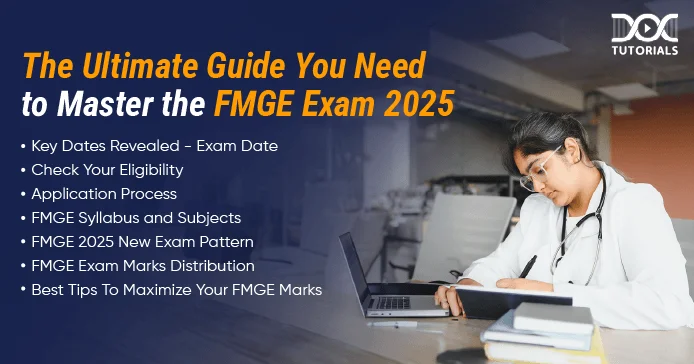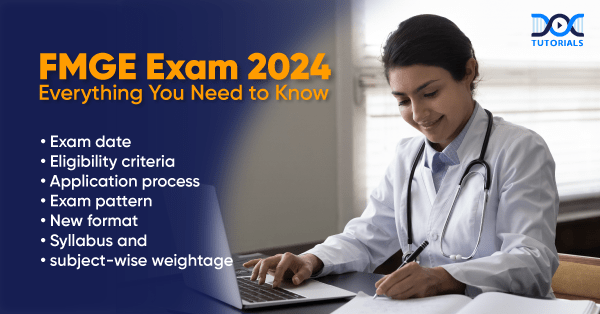
The Foreign Medical Graduate Examination (FMGE), slated for 2025, remains a pivotal assessment for foreign medical graduates aspiring to practice medicine in India. This detailed guide covers every aspect of the FMGE Exam 2025, including the exam dates, eligibility criteria, application process, syllabus, subjects covered, and an in-depth look at the exam pattern, alongside a specific focus on marks distribution.
This comprehensive analysis aims to equip candidates with the necessary information to prepare effectively and succeed.
FMGE 2025 Exam Date and Important Timeline
The FMGE exam 2025 is expected to adhere to its usual biannual schedule, with tests typically administered in June and December. Although exact dates for 2025 have not been confirmed, candidates are advised to regularly check the National Board of Examinations (NBE) official website for the latest updates and to ensure they do not miss important deadlines. Below is the anticipated timeline of important actions, presented in a table format:
| Action | Estimated Month | Description |
| Notification Release | January 2025 | Release of the official notification for the June session. |
| Registration Opens | March 2025 | Opening of the registration window for the June session. |
| Exam Date | June 2025 | Administration of the FMGE Exam for the June session. |
| Results Declaration | July 2025 | Announcement of results for the June session. |
| Notification Release | August 2025 | Release of the official notification for the December session. |
| Registration Opens | October 2025 | Opening of the registration window for the December session. |
| Exam Date | December 2025 | Administration of the FMGE Exam for the December session. |
| Results Declaration | January 2026 | Announcement of results for the December session. |
This timeline is indicative and may change based on the official announcements from the NBE. Candidates are advised to stay informed by visiting the official NBE website regularly.
Eligibility Criteria for FMGE Exam 2025
Eligibility for the FMGE includes having a primary medical qualification from a medical school outside of India, which should be recognized for enrollment as a medical practitioner in the respective country. The World Directory of Medical Schools must list this qualification. Both Indian citizens and Overseas Citizens of India (OCI) who meet these qualifications are eligible to apply.
Application Process for FMGE Exam 2025
The NBE’s official website processes the FMGE application online. Applicants must complete the registration form, upload the necessary documents, and pay the applicable fee. Accuracy in the application process is critical to avoid disqualification.
- Notification Release: Check the NBE’s official website for the FMGE Exam 2025 notification which includes exam and registration details.
- Registration Portal Access: Access the registration portal on the NBE website once registration opens.
- Creating a User Account: New users need to create an account. Existing users can log in with their credentials.
- Filling Out the Application Form: Complete the application form accurately with personal and educational details.
- Document Upload: Upload necessary documents such as a passport-sized photo, signature, medical degree certificate, and identity proof, following specified formats.
- Payment of Application Fee: Pay the registration fee online via credit/debit card or net banking.
- Final Review and Submission: Double-check all entries and uploaded documents for accuracy before final submission.
- Confirmation and Printout: After submitting, save the confirmation and take a printout of the completed form.
- Admit Card Download: Download the admit card from the NBE website once available.
Regularly Check for Updates: Keep monitoring the NBE website for any updates or changes to the exam schedule or application status.
FMGE Syllabus and Subjects
The FMGE 2025 (Foreign Medical Graduate Examination) syllabus is designed to assess the comprehensive knowledge and skills of foreign medical graduates, ensuring they meet the standards required to practice medicine in India. The exam covers both pre-clinical and clinical subjects that are part of a standard MBBS curriculum in India. Here’s a brief overview of the main categories and key subjects included in the FMGE syllabus:
• Pre- and paraclinical subjects
These subjects form the foundation of medical knowledge, covering basic sciences and their application to medical practice:
- Anatomy: Study of the human body structure.
- Physiology: Functions of various systems within the body.
- Biochemistry: Chemical processes and substances that occur within living organisms.
- Pathology: Study of the causes and effects of diseases, especially the branch of medicine that deals with the laboratory examination of samples of body tissue for diagnostic or forensic purposes.
- Microbiology: Study of microorganisms, including bacteria, viruses, fungi, and parasites.
- Pharmacology: The science of drugs and their effect on the body.
- Forensic Medicine: Application of medical knowledge to legal issues, particularly in the context of medical law and ethics.
• Clinical Subjects
These subjects are focused on the diagnosis and treatment of diseases, preparing candidates for direct patient care:
- Medicine and Allied Subjects: This includes general medicine and specialties such as dermatology and psychiatry.
- Surgery and Allied Subjects: Encompasses general surgery and its specialties like Orthopedics and Anesthesiology.
- Pediatrics: Concerns the medical care of infants, children, and adolescents.
- Obstetrics and Gynecology: Deals with female reproductive organs’ health and the management of pregnancy.
- Community Medicine: Focuses on health care issues affecting communities and populations.
FMGE Exam 2025 Pattern
The FMGE exam 2025 pattern is designed to comprehensively test the knowledge and skills of foreign medical graduates. The exam consists of two papers, each containing 150 multiple-choice questions (MCQs), and spans a single day. Each paper is conducted in a separate session (forenoon and afternoon). The questions are clinical and applied, focusing on both recall and application, which challenges the candidates to demonstrate practical and theoretical knowledge.
- Paper Structure: Each of the two papers includes 150 questions, spread across various subjects aligned with the graduate medical education in India.
- Type of Questions: Questions are objective type, predominantly single best answer format.
- Duration: Each session lasts 150 minutes, providing candidates with approximately one minute per question.
- Marking Scheme: There is no negative marking in the FMGE Exam 2025, which encourages candidates to attempt every question without fear of penalty.
- Passing Criteria: Candidates must score at least 150 out of 300 total marks to pass the FMGE, which equates to a passing percentage of 50%.
FMGE Exam 2025 Marks Distribution
Here is a breakdown of the marks distribution based on the major subjects, ensuring candidates understand the weighting and focus areas:
| Category | Subject | Marks |
| Pre and Paraclinical Subjects | Anatomy | 17 |
| Physiology | 17 | |
| Biochemistry | 17 | |
| Pathology | 13 | |
| Microbiology | 13 | |
| Pharmacology | 13 | |
| Forensic Medicine | 10 | |
| Clinical Subjects | Medicine and Allied Subjects (including Psychiatry, Dermatology) | 33 |
| General Surgery and Allied Subjects (including Anesthesiology, Orthopedics) | 32 | |
| Pediatrics | 15 | |
| Obstetrics and Gynecology | 30 | |
| Community Medicine | 30 |
Preparation Tips for FMGE Exam 2025
To effectively prepare for the FMGE Exam 2025, consider leveraging the DocTutorials app, which offers comprehensive resources tailored for FMGE candidates. This app provides access to a vast array of preparation materials, including:
- Interactive Video Lectures: Engage with detailed video lectures covering all subjects in the FMGE syllabus.
- High-Yield Practice Questions: Test your knowledge with practice questions designed to reflect the exam’s format and difficulty level.
- Mock Exams: Simulate the FMGE experience with full-length mock exams to assess your readiness and improve your time management skills.
- Expert Guidance: Receive guidance and tips from experienced educators who understand the nuances of the FMGE.
Incorporating the DocTutorials app into your study routine can enhance your learning experience and significantly increase your chances of passing the FMGE Exam 2025.
- Understand the Exam Pattern: Familiarize yourself with the detailed structure and format of the FMGE to manage time efficiently during the exam.
- Concentrate on High-Yield Subjects: Give priority to subjects with a higher mark allocation and core clinical areas that receive frequent testing.
- Systematic Study Approach: Develop a systematic study plan that includes thorough reading, regular revisions, and self-assessment.
- Stay Updated: Keep abreast of any changes in the FMGE format, syllabus, or guidelines from the NBE.
Conclusion
The FMGE exam 2025 poses a significant challenge for foreign medical graduates seeking to practice in India. A thorough understanding of the exam’s structure, including a detailed insight into the exam pattern and marks distribution, can significantly bolster a candidate’s preparation strategy. By methodically preparing for high-weightage subjects and understanding the detailed exam pattern, candidates can enhance their chances of success and embark on a fulfilling medical career in India.
Latest Blogs
-

FMGE Exam Preparation with Our FMGE 2025 Vijeta Online Live Plan
FMGE (Foreign Medical Graduate Examination) 2025 is going to be daunting for multiple factors. But with the right tools and…
-

FMGE Exam 2024: Latest Pattern with Preparation Tips to Crack It
The full form of FMGE is the Foreign Medical Graduates Examination. It is also known as the MCI FMGE exam.…
-

FMGE Exam 2024: Date, Eligibility, Application, Syllabus & Subjects, and Exam Pattern
Are you a foreign medical graduate who wishes to practice in India? If so, you must clear the Foreign Medical…
 Back
Back


